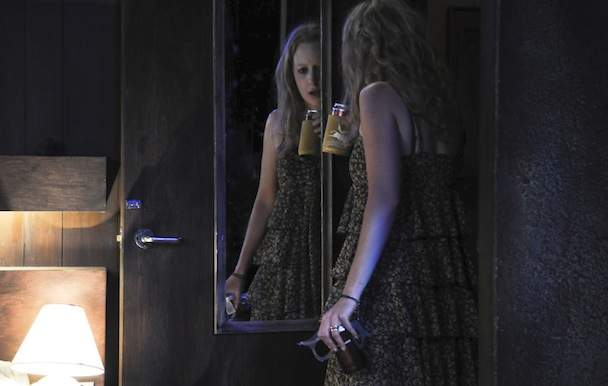The Dark Room
If these walls could talk, they'd tell you to leave this godforsaken place while you still can.
Overview
If these walls could talk, they'd tell you to leave this godforsaken place while you still can. And to take the greyish terry towelling bedspread with you.
You're inside a Northern Territory motel where the lives of several characters who have lodged here amongst the dank decor at different points in time are interwoven. Youth worker Anni (Leah Purcell) is chaperoning the severely (and for most of the play, unspecifically) traumatised teenager Grace (Billie Rose Prichard) while she searches for a foster home that will take her, and the two spend the night alternately fighting for dominance and trying to make a connection. Sometime later, but narratively in the same time and space, police officer Stephen (Brendan Cowell), recently exiled from Sydney, and his wife, Emma (Anne Lise Phillips), return to the room after a wedding celebration and begin to unfurl an argument that rakes over months of latent tension. A grizzled old cop (Cameron Stewart) enters after them, and sometimes yet another seems to be lurking in this crowded room.
Playwright Angela Betzien and director Leticia Caceras (collaborators at RealTV) have masterfully crafted The Dark Room so that its separate strands combine into a taut thriller that contains plenty of poetic moments. Naturalism is leavened by some Gothic styling a thumping heartbeat, haywire lighting, a creepy mask. You fear for when the lights go out. The script asks a lot of its actors Prichard, in particular, who brings the balance of innocence and violence to Grace necessary to anchor the play. Cowell and Phillips are electric as a couple, and with their repartee and Cowell's endearing drunkenness, you really warm to them.
The Dark Room is almost unbearably intense when it's over you'll wish you could wash your brain out with rainbows and kittens and be given some reason to hope again. But life is a shitty thing for a good number of people, and this play's real achievement is that it makes a world of unspeakable terror seem very human and incredibly close. It also isn't horror for horror's sake; it intersects with contemporary social issues in a non-ostentatious way.
It's well worth seeing, especially in the effectively claustrophobic Belvoir Downstairs space, which is small enough that the audience could conceivably be pressed into the same motel room as these unlucky, overlapping characters. We might all be ghosts who once stayed here, hopefully on more unremarkable nights.







